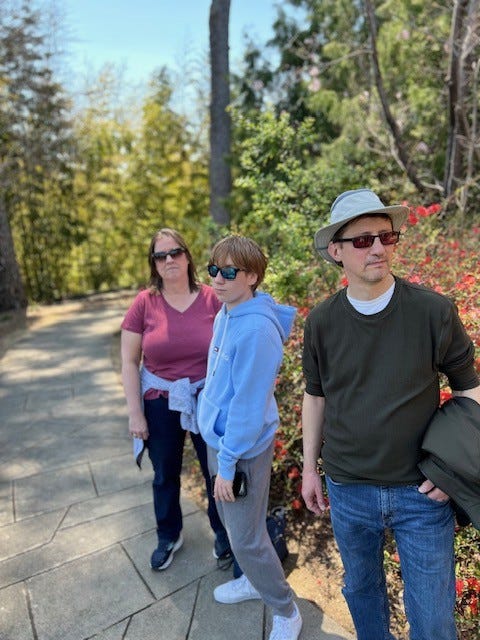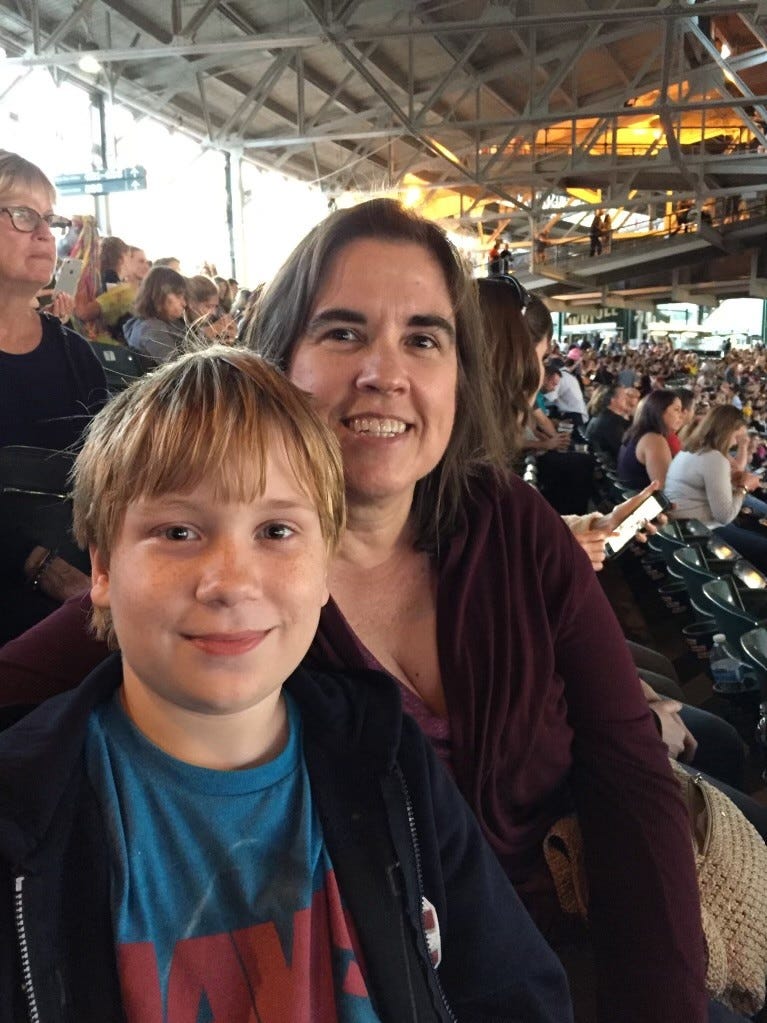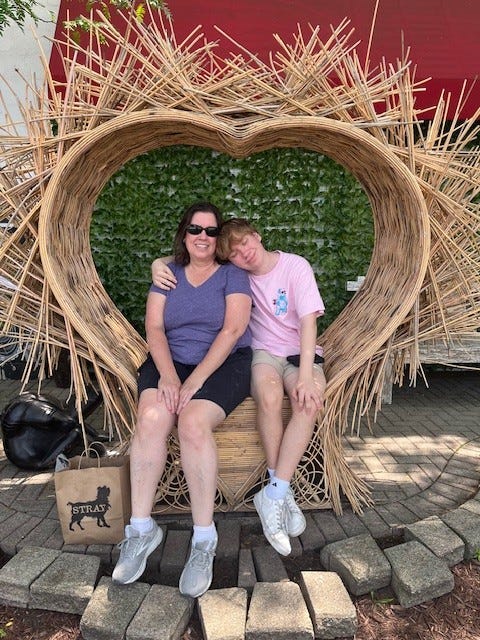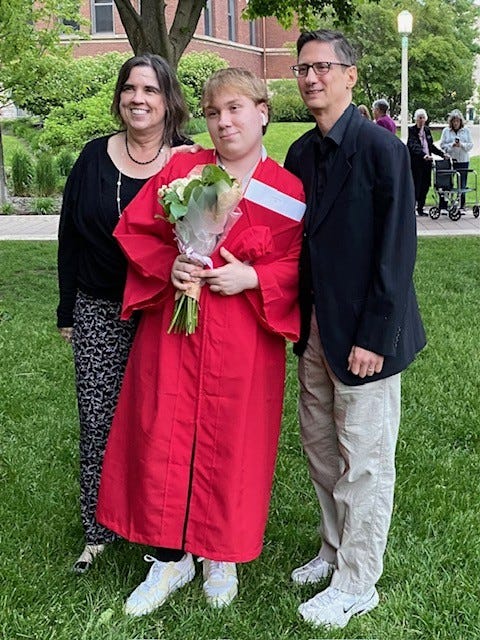On the Edge of Something New
As her son graduates from high school and gets ready for college, this mama is looking back and looking forward as she stands ready for her own next steps.
“Long days and short years.”
“Enjoy every moment.”
“Get involved with their school.”
“High school goes so fast.”
“Don’t blink.”
“Meet their friends but don’t BE their friend because you are their parent.”
“They will want to talk most when you are most tired.”
“The best time to talk is in the car.”
“It takes a village.”
We’ve all heard the sayings and slogans, and we’ve all seen the social media memes, and we’ve all likely read our fair share of parenting books and articles, and listened to podcasts and webinars to try to find the secrets of how to be a successful parent; about what it takes to guide our children from babies to adults.
My son is 17 years old, and he just graduated from high school last week. In the fall he is headed to college. I have spent nearly two decades focused on being the very best parent that I could be. I humbly suggest that I have figured out quite a few things about how to be a good parent. I will admit I probably took my parenting to an extreme at times. I couldn’t help myself. I have always been a bit of an overachiever. I tackle any task in front of me with the desire to always do and be the best that I can possibly be, and that strategy carried over into my parenting.
Involved parent? Yes, definitely. Helicopter parent? Sometimes. Lawn mower parent? Sometimes. I wandered my way through my parenting journey like anyone else: I started off by knowing, oh, basically nothing. But I learned from my mistakes and I absorbed knowledge and tips from friends and nannies and other parents, and I figured it out as each year passed. (Some of those cliched sayings and slogans do have some basis in truth by the way. It does take a village!) It’s safe to say that 17 years later I finally know a few things about what it takes to be a good parent; for instance, that as parents we need to teach our kids every little thing, even the things that are second nature to us: look both ways and sometimes look twice before crossing the street. I learned that sometimes you need to just sit there and listen without reacting or going into parent lecture mode. I learned that sometimes kids will surprise you with what they are capable of doing.
After 17 years of parenting, I have learned a lot. Now my question is: what comes next – for me? What happens for us parents, for us moms in particular, when we reach that momentous milestone of, say, a graduation or a college drop-off, when parenting maybe doesn’t need to be a 24/7 endeavor any more; when we can ease off the gas and just, well, maybe coast for a while; when we feel like we can exhale for a second; and we have a moment to not only think, but to think about ourselves again. What happens then? What do we do now?
In recent months, I have felt the pressure ever so slightly being lifted that I need to “be the mom”. I have felt a sense that maybe I will soon have some time and energy to do – and be – other things in addition to being a mom. I have felt a flicker of a future trying to light a path and entice me to focus on other things besides parenting.
The hardest part now? To figure out what that is.
I spent my 20s, 30s and my early 40s in the workforce. Actually, I started working part-time when I was 16-years old and basically worked full-time until we adopted our son when I was 43. I was fortunate enough to be an at-home mother for the past 17 years. I occasionally had some freelance writing and communication work, and at one point, I even worked a part-time job outside of the house. But mostly I was an at-home mom. It afforded me the privilege to be involved in the day-to-day life of my son at an in-depth level. It also gave me the time and space to be involved at all of his schools in a way that made me feel like I was contributing to a greater cause, with the added bonus of expanding my social circles. If I had been working outside of the home full-time, I may not have had the time to dedicate to volunteering at his schools in the ways that I did. I am grateful for my many years as an at-home mom.
And now, what’s next?
Do I go get a full-time job? A part-time job? Find another place to be a volunteer? Will I lose the social circles and connections that I made while volunteering at his schools? And what about the familiar structure of the past 17 years? I don’t need to get up early to take my son to school anymore. He has his driver’s license and we have decent public transportation where we live, so I don’t need to be my son’s on-call chauffeur so much anymore. Nightly meals are often replaced by his preferred Door Dash order, which means I don’t have to always figure out “what’s for dinner” tonight. I no longer need to contact teachers to address a school issue or reach out to other parents to set up a playdate or even remind him to take a shower.
I start to wonder if I am too old to re-invent myself. Who wants to hire a 59-year-old mom? I mean, I am smart and kind and friendly and a hard worker, (and gosh darn it people like me), but is all that good enough for whatever comes next for me? And why am I buying into any of this ageism fear anyways? And if I get a job, do I want to go back into the corporate communications field where I used to work? Or do I want to do something entirely different? Do I go get a certificate in a health or education profession which has always been of interest to me? Or maybe I get a part-time job at a school or a doctor’s office? Or maybe I go out of my comfort zone and get a job somewhere completely new for me, like hospitality or cyber-security! Where else can I volunteer? And will I enjoy it as much as I liked my volunteer work at the schools? Who do I know in my networks that can help me find a job or a volunteer position? At what point do I start to contact people and communicate my interests? What even are my interests?
Transitions are hard for me. I know this about myself and yet I still don’t always prepare for transitions even when I know they are coming. And the thing about transitions is that I actually do know the best way to get ready for them. I have seen other people handle their own life transitions with what looks to be relative ease. The key? Look ahead and figure out what will be helpful in the future and then set yourself up now for the future transition. I have a friend who retired as a teacher from one school but then continued his passion for coaching at a different high school. The key is that he had been coaching at the other school even before he retired. So his transition from teaching to retirement to coaching was a no-brainer: he was already doing it and had the pieces in place when the transition time hit.
Even my son set up his future plans. In fact, one of his high school senior projects was to research and decide his post-secondary career or education plan. The school district requires every senior to have a post-graduation plan in place. It is a graduation requirement! And it is a good idea.
I don’t have a plan in place for me. I haven’t done that. I have been focused on the task at hand: parenting my son from baby to adult. So even though I know future planning is beneficial to managing transitions, and I knew this transition was coming for me, I did not make my own plans.

The hardest part about a transition for me is being comfortable with the uncomfortable. It’s about settling into the feeling of not knowing what comes next, of losing today’s familiar daily structure and trusting that I will figure out what comes next; that I will build the next decade much like I did the last decade – one day at a time, trying new things, meeting new people, feeling nervous about the newness of a situation but forging ahead anyway to keep carving my path even if I can’t see around the bend. I have to trust in myself and what I like to call the “magic of the universe” that whatever my future holds next will be okay. And I have to hope that the anxiety of not knowing does not send me into a panic.
I read somewhere recently that the equation for happiness is defined as pleasure plus purpose. I will have to find a balance of pleasure and purpose in whatever I do next and trust that it will bring me some happiness.
I am not going to end this essay with a conclusion that definitively says: this is what I will be doing. I don’t know what I will be doing six months from now or a year from now. Ask me again in six months and I will have a better idea.
Written By Carol Stoker, Contributing Writer
Carol Stoker, 59, is in the final stages of her role as an at-home mother and is working on figuring out where she will go from here. She worked for many years in communications as a writer, editor, and project manager, and enjoys living on the north side of the city of Chicago with her husband and son.






